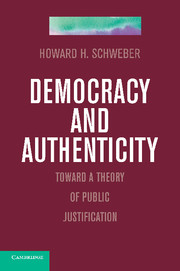Book contents
- Frontmatter
- Contents
- 1 Introduction
- Part One The Case for Constraint
- Part Two Responding to the Case for Inclusion
- 7 Arguments from Consequences
- 8 Further Arguments from Consequences
- 9 Fairness as Equality
- 10 Fairness as Recognition
- 11 The Argument from Epistemology
- 12 Empiricism and Public Justification
- 13 Toward a Theory of Public Justification
- Bibliography
- Index
12 - Empiricism and Public Justification
from Part Two - Responding to the Case for Inclusion
Published online by Cambridge University Press: 05 November 2011
- Frontmatter
- Contents
- 1 Introduction
- Part One The Case for Constraint
- Part Two Responding to the Case for Inclusion
- 7 Arguments from Consequences
- 8 Further Arguments from Consequences
- 9 Fairness as Equality
- 10 Fairness as Recognition
- 11 The Argument from Epistemology
- 12 Empiricism and Public Justification
- 13 Toward a Theory of Public Justification
- Bibliography
- Index
Summary
In Chapter 11, there was a shift from focusing on the accessibility of justifications to the accessibility of standards of reliability, an example of the by-now-familiar move to a second order of inquiry. That change in focus responded to Alexander's approach of comparing the different ways in which persons experience their beliefs in descriptive statements about events. Religiously grounded political arguments, however, more often have to do with moral teachings than with declarations of fact. The nonequivalence of Ann's beliefs about descriptions of states of affairs does not obviously extend to a similar nonequivalence between religious and secular normative principles. In addressing that question, the focus of the discussion shifted to another second-order question, this time one that focused on the accessibility of the logic that connected empirical beliefs with normative consequences rather than on the evidence that established the basis for belief in the occurrence of events. These are not cleanly separable inquiries. It should be clear that an epistemological standard of accessibility implicates arguments about both the basis for reliability claims and the ways in which those claims are made the basis for arguments that appeal to shared values. Nonetheless, the questions of whether standards of reliability are publicly accessible and how standards of reliability address normative justifications remain distinct in their respective focus on the basis for accepting empirical assertions as true and the logic by which normative claims are derived. And there is yet a third question to be asked: What do these epistemological standards require of citizens in practice? These three questions – What are the evidentiary standards of accessibility for second-order claims of reliability?; How do those standards constrain the logic of justification?; and What demands do epistemological standards of accessibility impose on citizens as a matter of democratic practice? – provide the organizing structure for this chapter.
- Type
- Chapter
- Information
- Democracy and AuthenticityToward a Theory of Public Justification, pp. 364 - 390Publisher: Cambridge University PressPrint publication year: 2011



